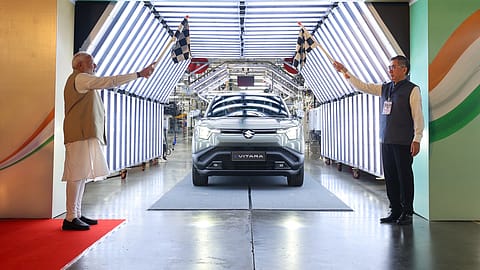Maruti Suzuki ships over 2,900 of its much-awaited e-Vitara to 12 European nations
Although Maruti Suzuki has been late to the EV race, it is looking to leverage exports to become India’s top electric car manufacturer within a year.

Maruti Suzuki India, the country’s largest manufacturer of passenger vehicles, announced on Monday that it has shipped over 2,900 units of the e-Vitara, its highly anticipated battery electric vehicle, to 12 European countries from its Pipavav Port in Gujarat.
The e-Vitara is Suzuki’s first battery electric vehicle, exclusively manufactured at the carmaker’s Gujarat manufacturing facility. It is currently being shipped to the United Kingdom, Germany, Norway, France, Denmark, Switzerland, the Netherlands, Sweden, Hungary, Iceland, Austria, and Belgium. “We are sure that with a nimble and sharp driving experience, it will delight customers in Europe,” said Hisashi Takeuchi, MD and CEO, Maruti Suzuki India Limited, in a statement.
In August, Prime Minister Narendra Modi flagged off the e-Vitara at the Suzuki Motor Gujarat plant in Hansalpur. Maruti Suzuki plans to manufacture 70,000 units of e-Vitara in FY26. The e-Vitara would be the first set of cars from the automaker to be exported to over 100 countries worldwide. Suzuki has invested ₹21,000 crore in its Hansalpur plant, which has an annual production capacity of 7.50 lakh units. PM Modi also hailed Maruti Suzuki as a brand ambassador of the ‘Make in India’ initiative.
PM Modi also inaugurated a lithium-ion battery cell and electrode factory, established under a joint venture between Toshiba, Denso, and Suzuki, for strong hybrid electric vehicles (SHEVs). The plant will boost domestic manufacturing and ensure that more than 80% of the battery value will now be manufactured within India, according to a statement released by the Prime Minister’s Office.
Although the Japanese carmaker has been late to the EV race, it is looking to leverage exports to become India’s top electric car manufacturer within a year. This is the first time that a global automobile giant like Suzuki has chosen India as the global manufacturing hub for EVs.
“India’s electricity price is much lower at ₹7-8 per kilowatt. Indian electricity prices are one-third of those in Japan. For customers, the running cost of EVs is much cheaper than that of normal ICE cars,” Hisashi Takeuchi, the managing director and CEO of Maruti Suzuki, told Fortune India earlier this year.
While the e-Vitara is expected to be launched in the Indian market later this year, the company has announced plans to establish an EV charging ecosystem to address customer pain points. “We are going to eliminate customer concerns about EVs. For example, if range anxiety is a concern for customers, the next new products we introduce will have a sufficiently long range, which will alleviate customer concerns. We have a vast network of sales and service touch points across India. We are going to utilise those sales and service touch points for them to charge their EVs,” Takeuchi said earlier this year.
